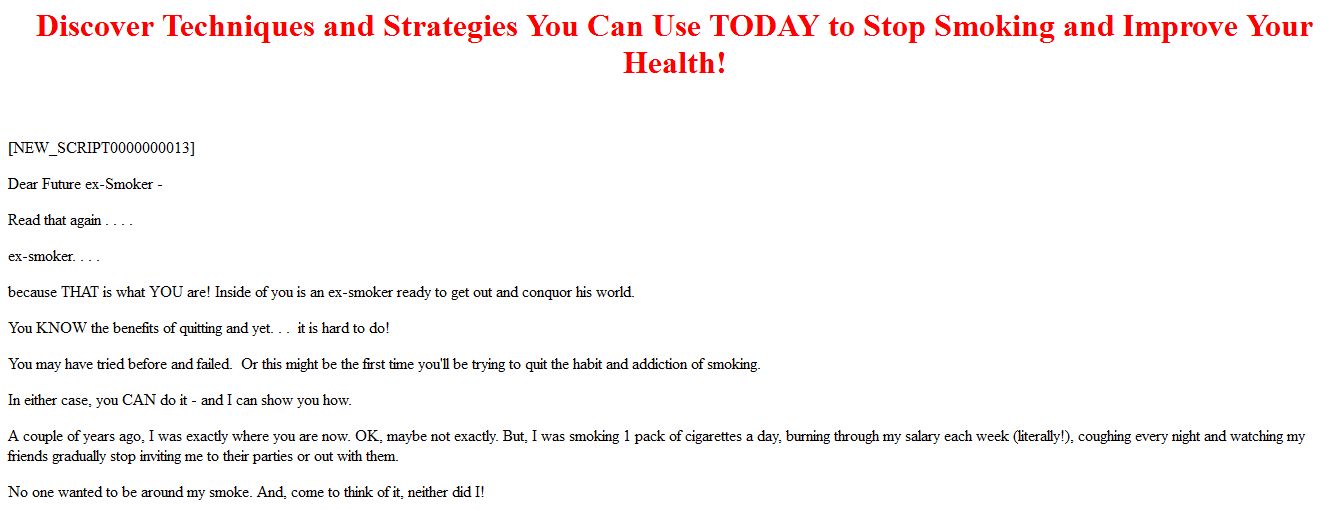Stop Smoking PLR Product: Become the Go-to Expert and Help Your Clients Improve Their Health Today!
Searching for the right tools to help your audience live healthier and happier lives? You’re in the right place! Introducing our latest private label rights product – Stop Smoking PLR ebook. This comprehensive guide is packed full of expert advice, helpful strategies, and practical solutions your clients need to kick the habit for good.
This PLR product gives you the unique opportunity to provide top-notch content to your clients, and here’s what they’ll discover inside:
- Motivation Mastery: Learn proven techniques to boost motivation during the critical first 3 days of nicotine withdrawal.
- Trigger Troubleshooting: Identify and dodge smoking triggers with ease.
- Craving Combat Strategies: Discover a fail-proof trick that can be used anywhere, anytime to combat nicotine cravings.
- Healing Timeline: Understand how and when the body starts to recover from the impact of smoking.
- The Quit Smoking Blueprint: A step-by-step guide to quit smoking and what to do in case of a relapse.
- Addiction Awareness: Explore the mechanics of nicotine addiction to fight it effectively.
- Safe Solutions: Uncover non-pharmaceutical aids to quit smoking, adding no extra drugs to the body.
And much more!
This PLR ebook is a powerful tool for your content arsenal. You can rebrand it, modify it, and sell it as your own. Use it as a lead magnet to grow your email list, create an online course, or even as the basis for a live workshop. It’s a versatile solution that can be tailored to your business needs.
Remember, when you purchase this PLR product, you’re not just buying a digital product. You’re acquiring the potential to transform the lives of your clients and prospects while positioning yourself as a subject matter expert in this crucial health-related niche.
Unlock the power of private label rights and leverage the PLR Stop Smoking product to boost your business and services today. Time to light up your business growth, not a cigarette!
Salespage Snapshot:

Stop Smoking PLR Ebook Table of Contents
Why Stop Smoking?
Why Start Smoking?
Know Your Enemy
Why People Smoke
Nicotine – The Drug
What Happens When You Stop Smoking?
Smoking is a Drug Addiction
What are the Steps?
How to Handle the Urges
Stop Smoking Helps
Hypnosis
Magnets
Nicotine Replacement Therapy
Addressing Weight Gain
PLR Stop Smoking Ebook Sample Content Preview
Know Your Enemy
Nicotine creates a biochemical reaction in your body that has an immediate effect on your mood, your ability to reason, and your metabolism. Even if you only smoke a few cigarettes a day your body feels the results and side effects of the more than 4,000 chemicals being pumped in through the lungs.
The more that you smoke, the higher the level of chemical dependency that is reached. Light smokers also become dependent on cigarettes through a physical dependency on the nicotine as well as the psychological and stress related dependency on the act of smoking.
It is only a matter of seconds after that first puff that nicotine starts to have an effect on your central nervous system, and the rest of your body. Certain areas of the brain, when stimulated by nicotine, help you think more clearly. Other areas of the brain in the pleasure center are stimulated and can make you feel more relaxed and less anxious.
Nicotine also affects the hormones produced by the body, which creates a chemical dependency to nicotine and the accompanying craving. Heavy smokers have become dependent on heightened levels of hormones, stimulated by nicotine, which can have an addictive quality. They need a cigarette at certain intervals of time. After the stimulation of the hormones starts to fall, they need another cigarette to bring them back into the comfort zone. If they do not get that cigarette, the craving begins.
Interestingly when you smoke and exhale all of the smoke you dragged into your lungs with each puff isn’t exhaled. It takes several hours to rid the lungs of the last cigarette – some say 24 hours. And we all know that smokers don’t wait 24 hours between each cigarette!
In an experiment, the nicotine and tar of 2,000 cigarettes were collected (10 cigarettes a day for 6 months; 20 cigarettes a day for 3 months). Researchers found that diluted further and painted once on the skin of mice, cancer developed on 60% of the animals within a year.
Considering that many chemicals are banned when they cause cancer in 5% of the time this statistic is extraordinary.
Nicotine also will cause an initial release of adrenaline, a fight or flight hormone. This will cause the heart rate to increase, increase blood pressure and cause rapid shallow breathing. It also tells the body to dump more glucose into the blood stream to help defend you and blocks the release of insulin which will help the cells take up the glucose in the blood. Smokers often feel that cigarettes are an appetite suppressant and this may be the reason. When there is a hyperglycemic effect, more glucose in the blood, this may suppress the appetite of the smoker.
Nicotine may also slightly increase the basal metabolic rate – or the base rate at which the metabolism runs and burns calories. However, exercise will also increase the basal metabolic rate while not causing the damaging health effects that smoke does.
In the long run nicotine and the other chemicals will also increase the level of bad cholesterol (LDL) that damages your arteries. This increases the likelihood that the smoker will have a heart attack or stroke.
In fact, one myth that has been perpetuated for years is that smokers have a higher risk of death from lung cancer. While their risk of developing lung cancer is much higher than the general population, they are also at a much higher risk and have a much higher rate of death from circulatory issues such as heart attack or stroke.
Nicotine also has an effect on the brain and its function. Like a computer your brain process information and then stores it for future use. In a computer this information is stored in the form of electricity while in the brain neurons are the cells that transfer and integrate that information. Each neuron has thousands of bits of input from other neurons in proximity in the brain. These signals help the neuron to calculate if the signal it receives will be passed to other neurons in the pathway.
The signals that run through the neurons are conducted as electrical current but between neurons there are chemical transmitters called neurotransmitters. These neurotransmitters move over the space between the two neurons and fit into a special receptor in the cell. Once in place they set in play a physiological change that allows the neuron to send the signal.
Each neurotransmitter has a specific family of receptors or places to bind on the cell. Nicotine works by inserting into a receptor that normally takes acetylcholine. Depending upon the area of the body acetylcholine is responsible for delivering signals from the brain to the muscle, controls heart beat and breathing, oversees the flow of information in the brain and plays a role in learning and memory.
Nicotine will lead to a burst of activity in those receptors but there is no regulation to the distribution of the chemical like there is for acetylcholine when the body releases it. This increased stimulation will lead to an increased amount of body and brain action that the smoker interprets as a way of re-energizing themselves. Using these pathways reaction time and ability to pay attention will improve.
Stimulating these neurons will also promote the release of dopamine in the reward pathway of the brain. Simply put these chemicals make you feel pleasure and feel good which encourages the smoker to seek that peace and happy feeling again and again. It will also increase the release of glutamate which is a transmitter involved in learning and memory. Researchers have found that glutamate may create a memory loop of the good feelings that you receive from the nicotine and further drive the desire to use the source of the drug.
Nicotine may cause all of these effects in the body but it is only ONE of the over 4,000 chemicals KNOWN to be in cigarette smoke. The real damage that happens to the lungs happens from the smoke itself. While inhaling smoke particles are also deposited into the lungs. These particles are bits of hydrocarbon that damage the lung tissue and cause cancer.
These particles are deposited into the alveoli (small air sacs in the lungs) and because of their weight they do not leave. The body scrambles quickly to try to neutralize the hydrocarbons and other chemicals that are deposited but unless the smoker smokes only one cigarette every 3 days the body is unable to keep up the housekeeping duties.
Other Details- 1 Ebook (DOCX, PDF, TXT), 24 Pages
- 1 Salespage, Squeeze Page (TXT)
- Affiliate Programs List (DOC)
- Keywords List (XLS)
- Bonus Images (JPG)
- File Size: 727 KB














